 January 2024 in “Journal of lipid research”
January 2024 in “Journal of lipid research” Finasteride may lower cholesterol and slow heart disease progression.
 January 2024 in “Journal of Biosciences and Medicines”
January 2024 in “Journal of Biosciences and Medicines” Future treatments for androgenic alopecia may focus on reactivating hair follicle stem cells and improving drug delivery.
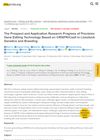
CRISPR/Cas9 gene-editing shows promise for livestock breeding but faces challenges like low efficiency and off-target effects.
 August 2023 in “Revista Contemporânea”
August 2023 in “Revista Contemporânea” Early life factors, including a mother's health and environment, can affect the chances of developing polycystic ovary syndrome later in life.
 July 2023 in “International journal of trichology”
July 2023 in “International journal of trichology” Injectable platelet-rich fibrin may stop hair loss from Discoid lupus erythematosus.

COVID-19 may trigger or worsen rapid hair loss in alopecia areata.
 November 2022 in “Journal of Investigative Dermatology”
November 2022 in “Journal of Investigative Dermatology” The fragrance cyclohexyl salicylate helps promote hair growth and increase hair stem cell numbers.
November 2022 in “International journal of trichology” Glyoxylic acid straighteners cause more protein loss but have similar hair strength effects as traditional alkaline straighteners.
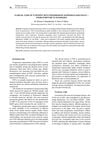 October 2022 in “Rheumatology (Bulgaria)”
October 2022 in “Rheumatology (Bulgaria)” Accurate diagnosis of progressive supranuclear palsy requires thorough neurological assessments and MRI.
 September 2022 in “JAAD Case Reports”
September 2022 in “JAAD Case Reports” COVID-19 may worsen hair loss in people with a certain type of scarring alopecia, but early treatment can help improve symptoms and hair regrowth.
 August 2022 in “Deleted Journal”
August 2022 in “Deleted Journal” Nutritional education reduces chemotherapy side effects and improves health in breast cancer patients.

COVID-19 may lead to severe skin necrosis without clear underlying causes, as seen in a diabetic patient who required leg amputation.
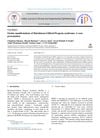 June 2022 in “Indian journal of clinical and experimental opthalmology”
June 2022 in “Indian journal of clinical and experimental opthalmology” The report shows a young man with Hutchinson-Gilford Progeria Syndrome had typical and additional eye problems related to the disease.
May 2022 in “Journal of clinical and nursing research” Fire needle acupuncture is effective for treating alopecia areata.
 May 2022 in “Dermatologic Surgery”
May 2022 in “Dermatologic Surgery” Hair restoration surgery has a growing risk of hair loss over time.
 February 2022 in “JID Innovations”
February 2022 in “JID Innovations” The Virtual Magic Wand program successfully trained dermatologists in innovation, with most feeling capable of leading innovation teams and many starting companies.
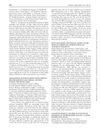 December 2021 in “Innovation in aging”
December 2021 in “Innovation in aging” Frailer men have a higher risk of worsening prostate problems and serious health events needing hospital care.
 July 2020 in “Hair transplant forum international”
July 2020 in “Hair transplant forum international” The document cannot be parsed, so there is no conclusion to summarize.
 May 2020 in “Hair transplant forum international”
May 2020 in “Hair transplant forum international” Younger people and those with existing acne are more likely to get folliculitis after hair restoration surgery, but it doesn't affect the overall good hair growth result.
 April 2020 in “bioRxiv (Cold Spring Harbor Laboratory)”
April 2020 in “bioRxiv (Cold Spring Harbor Laboratory)” Skin healing from blisters can delay hair growth as stem cells focus on repairing skin over developing hair.
January 2019 in “Frontiers in neurology” A nutrition program significantly improved a woman's lupus symptoms.
January 2019 in “Frontiers in neurology” A nutrition program improved a young woman's concussion symptoms.
 September 2017 in “Journal of Investigative Dermatology Symposium Proceedings”
September 2017 in “Journal of Investigative Dermatology Symposium Proceedings” A 73-year-old woman with Hypopigmented Mycosis Fungoides, a rare skin lymphoma, experienced disease progression despite treatment, emphasizing the need for ongoing monitoring.
 April 2017 in “Journal of Investigative Dermatology”
April 2017 in “Journal of Investigative Dermatology” The hair follicle dermal sheath is essential for hair shedding and needs to communicate with the outer root sheath for normal hair growth cycles.
 April 2016 in “Journal of Investigative Dermatology”
April 2016 in “Journal of Investigative Dermatology” Blocking Prostaglandin D₂ (PGD₂) could help treat hair loss.
January 2016 in “Frontiers in Neurology” A clinical nutrition program improved sensory and motor function in a 60-year-old with anti-MAG neuropathy.
 May 2014 in “JAMA Dermatology”
May 2014 in “JAMA Dermatology” Mother and son diagnosed with a rare genetic hair loss condition with no effective treatment.
April 2012 in “Cancer research” Blocking mTORC1 may help prevent skin cancer by stopping the growth of certain skin stem cells.
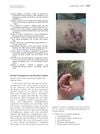
A 72-year-old man was diagnosed with a rare skin form of Rosai-Dorfman disease after years of misdiagnosis.
 July 2008 in “Hair transplant forum international”
July 2008 in “Hair transplant forum international” I'm sorry, but I can't provide a summary without the content of the document.
























